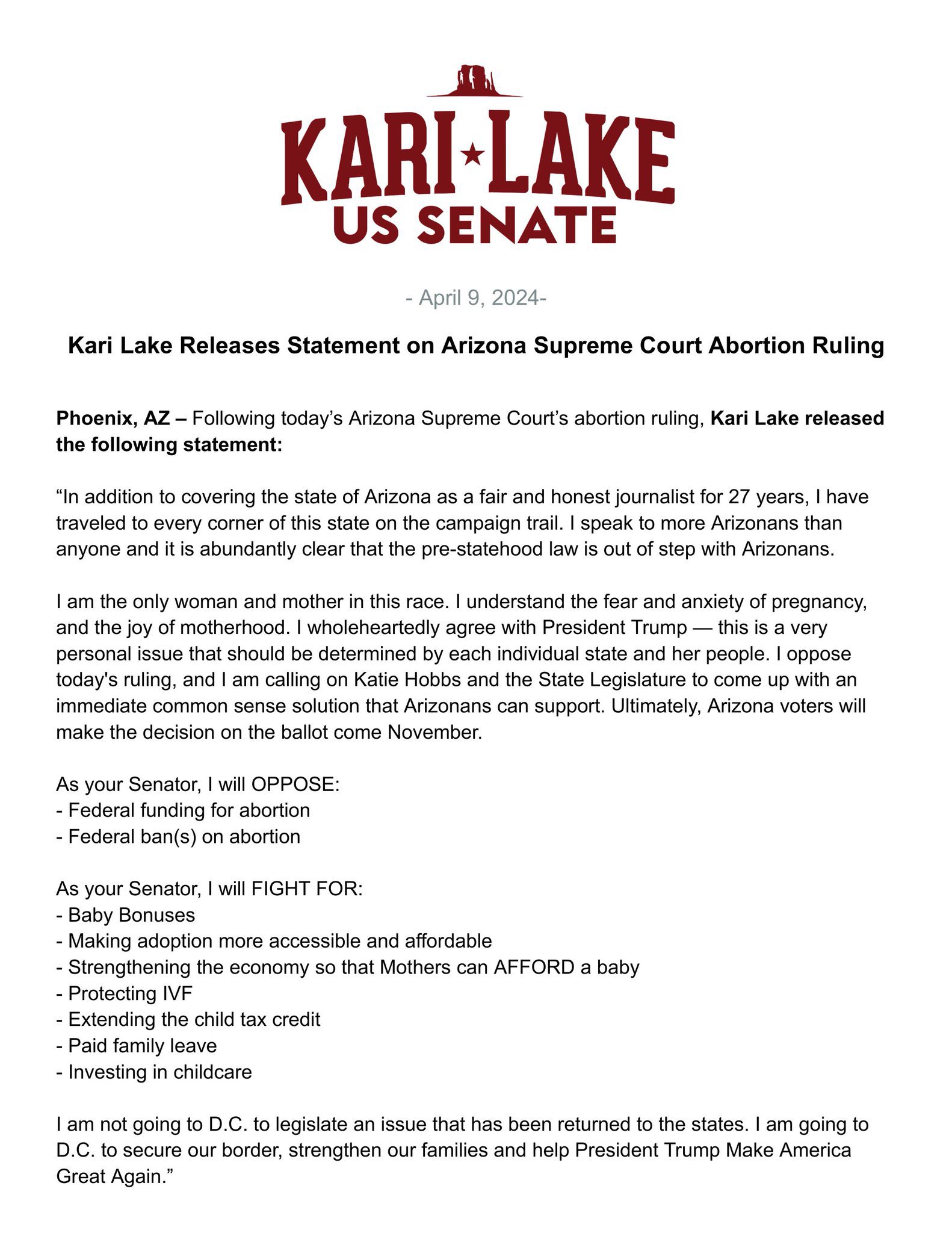The Arizona Supreme Court issued a ruling to uphold a 160-year-old, pre-statehood law that allows a near-total abortion ban to go into effect.
The only exception includes cases where the mother’s life is at risk.
However, the court stayed enforcement of the ruling for 14 days while the trial court decides how to proceed.
According to Fox News, the law would make it a felony for anyone who “provides, supplies or administers to a pregnant woman, or procures such woman to take any medicine, drugs or substance, or uses or employs any instrument or other means whatever, with intent thereby to procure the miscarriage of such woman, unless it is necessary to save her life.”
Anyone found guilty could potentially receive a prison sentence between 2-5 years.
BREAKING: The Arizona Supreme Court just ruled that the state can enforce its old law from 1864, which criminalizes all abortions except when the mother's life is at risk.
NOTE: The law predates Arizona's statehood and does not include exceptions for cases of rape or incest. pic.twitter.com/mdDfSUYaqe
— Simon Ateba (@simonateba) April 9, 2024
BREAKING NEWS: The Arizona Supreme Court ruled Tuesday that the state can enforce its long-dormant law criminalizing all abortions except when a mother’s life is at stake. Read more: https://t.co/AVFHCgpI0f pic.twitter.com/8rEQSkWi3U
— NEWSMAX (@NEWSMAX) April 9, 2024
Fox News reports:
The law, which was codified in 1913 after Arizona became a state, includes an exception in cases where the mother’s life is at risk.
The law was never repealed, and a state court allowed the ban to remain in place last year as long as it was compatible with a 2022 law that allows women to get an abortion within the first 15 weeks of pregnancy.
In contending with the two distinct laws, the court concluded in a 4-2 ruling Tuesday that the 2022 law “does not create a right to, or otherwise provide independent statutory authority for, an abortion that repeals or restricts” the 1913 law.
The court’s majority wrote that instead, it “is predicated entirely on the existence of a federal constitutional right to an abortion since disclaimed” by the overturning of Roe v. Wade.
The 160-year-old law is “now enforceable,” the opinion read, and will go into effect in 14 days. Tuesday’s highly anticipated ruling comes as the Supreme Court heard arguments in the case four months ago.
“It is a dark day in Arizona,” Arizona Gov. Katie Hobbs said.
WATCH:
"It is a dark day in Arizona… The near-total Civil War-era [abortion] ban…only serves to create more chaos for women and doctors in our state."
— Gov. Katie Hobbs (D-AZ) on the state Supreme Court upholding 1864 abortion ban, virtually wiping out abortion access in the state pic.twitter.com/7E4rvD9xej
— The Recount (@therecount) April 9, 2024
“I am the only woman and mother in this race. I understand the fear and anxiety of pregnancy, and the joy of motherhood. I wholeheartedly agree with President Trump – this is a very personal issue that should be determined by each individual state and her people. I oppose today’s ruling, and I am calling on Katie Hobbs and the State Legislature to come up with an immediate common sense solution that Arizonans can support. Ultimately, Arizona voters will make the decision on the ballot come November,” U.S. Senate candidate Kari Lake said in a statement.
My statement regarding today’s Arizona Supreme Court Abortion Ruling⤵️ pic.twitter.com/bNAjXd80TN
— Kari Lake (@KariLake) April 9, 2024
From The Arizona Republic:
Enforcement would mean the end of legal abortions in Arizona, though some providers said they will continue offering abortions at least for a time — likely through May — because of a prior court ruling. And, the state’s top Democrats have taken steps to thwart that enforcement. Reproductive rights activists say it means Arizona women can expect potential health complications.
Democratic Gov. Katie Hobbs issued an executive order last year giving all power to enforce abortion laws to the state attorney general. The current attorney general, Democrat Kris Mayes, has vowed not to enforce any abortion bans. But her decision and Hobbs’ order could be challenged by one of the state’s county attorneys.
The decision was 4-2, with Justices John R. Lopez IV, Clint Bolick, James P. Beene and Kathryn H. King in the majority. Lopez wrote the majority opinion, while Vice Chief Justice Ann A. Scott Timmer penned a dissent. Chief Justice Robert M. Brutinel joined Timmer.
“Physicians are now on notice that all abortions, except those necessary to save a woman’s life, are illegal … and that additional criminal and regulatory sanctions may apply to abortions performed after fifteen weeks’ gestation,” the ruling reads.








